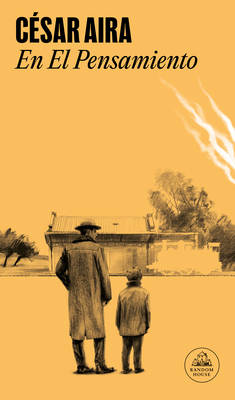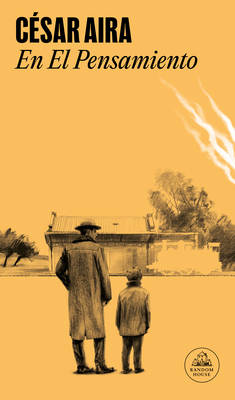
- Retrait gratuit dans votre magasin Club
- 7.000.000 titres dans notre catalogue
- Payer en toute sécurité
- Toujours un magasin près de chez vous
- Retrait gratuit dans votre magasin Club
- 7.000.0000 titres dans notre catalogue
- Payer en toute sécurité
- Toujours un magasin près de chez vous
Description
La nueva novela de César Aira, «uno de los novelistas más provocativos e idiosincrásicos de la literatura en lengua española». -The New York Times
En un lugar remoto de La Pampa argentina se encuentra El Pensamiento: un par de calles y un puñado de casas construidas alrededor de una estación ferroviaria. Dejándose llevar por los recuerdos hasta ahora olvidados, el narrador de esta historia evoca el último año que vivió en esta diminuta localidad, con siete años y justo antes de mudarse a la ciudad de Coronel Pringles con su familia. Criado en un ambiente rural, entre sirvientas, una madre tierna y un patriarca que poco a poco ha ido comprando el pueblo entero, su último año estuvo marcado por dos sucesos memorables que hicieron tambalearse la idílica paz rural de los vecinos: la llegada de un preceptor venido de la ciudad para hacerse cargo de la educación del narrador y el misterioso incidente con una locomotora desaparecida. Entre personajes que parecen sacados de una novela decimonónica, guiños proustianos y estampas pampeanas de una Argentina que quiere abrazar el progreso y el orden, Aira construye una novela de iniciación que muta y nunca es lo que aparenta ser, pero que despliega de nuevo el gran talento, el desbordante imaginario y la originalidad radical que caracterizan la obra de uno de los grandes autores de nuestro tiempo. ENGLISH DESCRIPTION The new book by César Aira, "one of the most provocative and idiosyncratic novelists working in Spanish today."-The New York Times
A remote corner of the Argentine pampas is home to El Pensamiento [Thought]: a few streets and a handful of houses clustered around a railway station. Yielding to long-forgotten memories, the narrator of this story evokes the last year he lived in this tiny settlement before moving to the city of Coronel Pringles at the age of seven. Raised in the countryside in a home with servants, a gentle mother and a patriarchal father who gradually bought up the whole town, his final year there was marked by two memorable events that shook the idyllic rural peace: the arrival of a tutor from the city meant to take charge of his education, and the mystery of a vanished locomotive. Filled with characters that seem lifted from nineteenth-century literature, Proustian winks, and scenes of rural life in a country racing to embrace order and progress, this is a novel of initiation that constantly mutates and is never what it seems to be. In Thought again showcases the great talent, formidable imagination and radical originality that characterizes the work of one of the best authors of our time.
En un lugar remoto de La Pampa argentina se encuentra El Pensamiento: un par de calles y un puñado de casas construidas alrededor de una estación ferroviaria. Dejándose llevar por los recuerdos hasta ahora olvidados, el narrador de esta historia evoca el último año que vivió en esta diminuta localidad, con siete años y justo antes de mudarse a la ciudad de Coronel Pringles con su familia. Criado en un ambiente rural, entre sirvientas, una madre tierna y un patriarca que poco a poco ha ido comprando el pueblo entero, su último año estuvo marcado por dos sucesos memorables que hicieron tambalearse la idílica paz rural de los vecinos: la llegada de un preceptor venido de la ciudad para hacerse cargo de la educación del narrador y el misterioso incidente con una locomotora desaparecida. Entre personajes que parecen sacados de una novela decimonónica, guiños proustianos y estampas pampeanas de una Argentina que quiere abrazar el progreso y el orden, Aira construye una novela de iniciación que muta y nunca es lo que aparenta ser, pero que despliega de nuevo el gran talento, el desbordante imaginario y la originalidad radical que caracterizan la obra de uno de los grandes autores de nuestro tiempo. ENGLISH DESCRIPTION The new book by César Aira, "one of the most provocative and idiosyncratic novelists working in Spanish today."-The New York Times
A remote corner of the Argentine pampas is home to El Pensamiento [Thought]: a few streets and a handful of houses clustered around a railway station. Yielding to long-forgotten memories, the narrator of this story evokes the last year he lived in this tiny settlement before moving to the city of Coronel Pringles at the age of seven. Raised in the countryside in a home with servants, a gentle mother and a patriarchal father who gradually bought up the whole town, his final year there was marked by two memorable events that shook the idyllic rural peace: the arrival of a tutor from the city meant to take charge of his education, and the mystery of a vanished locomotive. Filled with characters that seem lifted from nineteenth-century literature, Proustian winks, and scenes of rural life in a country racing to embrace order and progress, this is a novel of initiation that constantly mutates and is never what it seems to be. In Thought again showcases the great talent, formidable imagination and radical originality that characterizes the work of one of the best authors of our time.
Spécifications
Parties prenantes
- Auteur(s) :
- Editeur:
Contenu
- Nombre de pages :
- 120
- Langue:
- Espagnol
Caractéristiques
- EAN:
- 9788439743293
- Date de parution :
- 23-05-24
- Format:
- Livre broché
- Format numérique:
- Trade paperback (VS)
- Dimensions :
- 135 mm x 230 mm
- Poids :
- 220 g

Les avis
Nous publions uniquement les avis qui respectent les conditions requises. Consultez nos conditions pour les avis.






